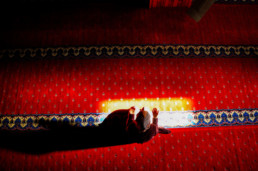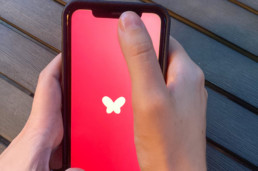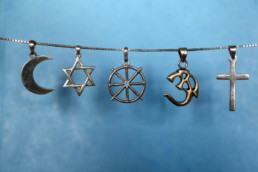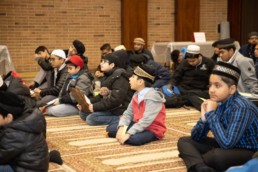Engraving God Upon the Heart
The act of engraving is deliberate, repetitive, and slow. It takes time to form even a crude surface outline, to say nothing of making it presentable, or even beautiful. You must make the same motion over, and over, and over (and over) again, patiently taking away a small piece of material each time. It becomes trance-like. But you must remain focused on the task, and not be robotic in your actions. No matter when you finish, there is the feeling that you can refine it, sharpen the image, remove some abstraction from your finished artwork.
The act of engraving the name of God upon your heart is no different to the Sufi.
Sufism is a branch of Islam that emphasizes spirituality and mysticism. Having a close and loving relationship with the Almighty is one of the chief goals of the Sufi, beyond just slavishly following the divine laws set forth in the holy books. It is a deliberate act to embrace Him.
The Naqshbandi Order of Sufism derives its name from two Farsi words, first “to engrave” (naqsh) and then to form a bond “bandi.” According to Madani Sheikh, a devotee of The Most Distinguished Naqshbandi Sufi Order of New York and New Jersey, this refers to carving the name of God upon the heart of the Sufi while forming bonds back to their spiritual teachers (called Mawlana, “Our Master”).
In order to carve the name of God onto their hearts, Sufis sing chants and meditate upon the words they hear, over and over and over again. One of the hymns they sing, The Opening Qasida, has 24 verses that each begin with “Yā Rabbi sallī ‘alā Muhammad” (“O Lord, bestow blessings upon Muhammad”). Another is 64 verses long, and takes over 10 minutes to sing.
A unique part of the Sufi worship is done towards the end of the service, after the night prayers are finished. Worshippers form a ring on the rugs they have carefully laid out on the floors, facing each other. As with all other parts of the service, the women and men sit separately. The faithful close their eyes, cross their legs, and place their open hands upon their knees, palms facing upwards. They wait silently, patiently, for their leader, Shaykh Diomande Soulieyman, to begin the chants.
At Soulieyman’s direction, Sheikh stood up, walked over to the light panel, and darkened the room. Only a few lights in the massive space were left on, just enough to illuminate the exits. The Sufis were shrouded by the darkness.
Soulieyman began to sing. He sung minutes-long verses that repeated four or five times apiece, his tone rising and falling. In the dim light, the Sufis swayed gently in time to his melodies. As the Shaykh sung into his microphone, connected to a powerful sound system, his followers could hardly be heard singing alongside. On the rare occasion he takes a breath though, their voices come through clear and harmonious.
The air of the darkened room was filled with their meditative chants. It did not matter that there were only 30 Sufis here, nor that they had to worship in an Episcopal Church on 28th Street because they had no Mosque of their own. It did not matter. For the moment, this was not a place of pulpits and altars, not one of a small community in a big city, not even one of sight. This was a place for God.
After 45 minutes, the chants slowly faded out with a long, mournful note. Sheikh quietly rose again and turned on the lights, which felt almost jarring after the extended trance of the meditation. The worshipers took each cupped their hands and brought them to their face as if splashing themselves with water. They had received God’s blessings through their meditation, and were spreading His gift over their skin.
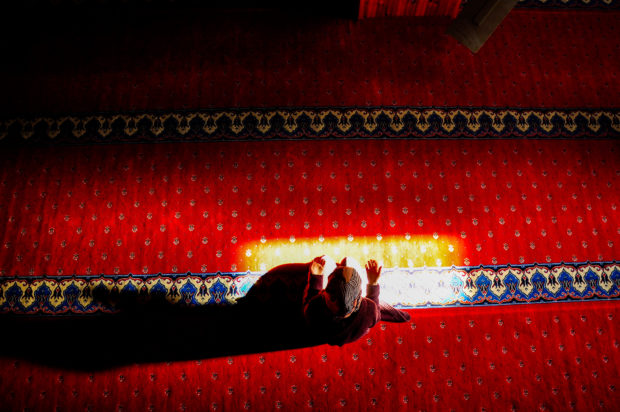
Soulieyman delivered a brief sermon, less than 10 minutes long, and everyone rose from their seated position. The service was over, and now it was time to share a meal.
They shared kabobs and lentil soup with lamb, drank a pineapple-ginger juice popular in West Africa, and chatted about life. They hadn’t been able to meet the week prior due to a snowstorm, and a few of them commented on how pronounced the absence felt after just a week. After such a powerful, transcendental experience in the dark, it’s hard to imagine missing even one service. The engraving on their hearts was made a little deeper that evening.
No Compromise In Obedience
Ask one million people how they feel about COVID-19 lockdown measures, you will get 1 million strong opinions. Ask a Sufi what they think about lockdown, and you will get a reserved and resigned response.
“Obey Allah, obey the Holly Prophet Muhammad, and obey those who are authorities. This is the basis of our life.” This is the guidance of Shaykh Diomande Suleyman, leader of The Most Distinguished Naqshbandi Sufi Order in New York/New Jersey. “Those authorities can be male; they can be female. They can be president, they can be governor, they can be a health director, a police officer, a supervisor – whoever is in that position of authority, you must obey that person.”
Obedience is a key part of being a Muslim and Sufis have raised this attribute to something of an art form. In the four stages of Sufism, the first two stages – sharia, the religious laws, and tariqah, the inner mystical path – govern how to live your life outward and inward to achieve spiritual enlightenment. Their literal translations from Arabic both refer to a type of pathway that must be followed in order to achieve the higher stages of truth and knowledge. Following the rules is foundational to Sufi spirituality.
According to Suleyman, you cannot pick and choose who you listen to and which rules you will follow. When the rules from different sources of authority conflict, it is the duty of the faithful to try and make them work together as best as possible. You can draw from the Quran, Islamic Scholars, government guidelines, and Allah himself when trying to arrive at the best compromise, but the rules must be followed.
Suleyman made it clear why following the rules, all the rules, is so important, especially in a time of pandemic. “All life is sacred. You have to save a life! So, by not coming to worship, it’s not something you choose or you like. Because God says life is sacred, we have to save it. You save lives by respecting the restrictions the authorities put in place.”
Still, there is an element of worship that cannot be captured at home, and no amount of justifying why a rule was put in place can overcome the sense of loss that follows. Zoom meetings are fine for passing a sermon, and the musical poetry of the Qasidas can be found on any platform that allows audio uploads. It’s ok – but it cannot capture the power of a zikar meditation in the dark, surrounded by the voices of other practitioners. You cannot pass the warmth of a shared meal through a screen as easily as you could a plate of food to a person beside you. Worship is about community, and the digital realm can only take you so far into the spiritual realm.
The Most Distinguished Naqshbandi Sufi Order had to abandon in-person worship in March of 2020, just like most other houses of worship around the United States. . Despite the yearning for their shared community, the members dutifully stayed apart for 15 months until the authorities told them they could return. They masked and sanitized as they were told, and refrained from shaking hands, an important part of establishing a connection to each other. Now, nine months later, they were able to worship with few restrictions. They could even share a meal again.
Speaking privately, Suleyman explained why he didn’t mind the lack of physical connection at first. “If you wear a nice perfume, and I sit near you for one hour, what happens? I will smell like it! When we sit together, the goodness is like a contagious disease. It jumps from one person to another person.” His measured and steady voice did not waiver as he made the analogy, but the barest hint of wry smile crossed his face as he let the comparison sink in before moving on. “One good person in the room means the whole group gains from that individual.”
As restrictions begin to ease in New York, the Sufis allow themselves to become closer physically and spiritually once more. Whether the rules change again or the path ahead becomes unclear, they know to accept and obey what they are told. For now, they revel in the spread of the spirit while the spread of COVID dies down.
Is online dating a more permissible option for Muslims?
Is online dating a more permissible option for Muslims?
Ammal Hassan
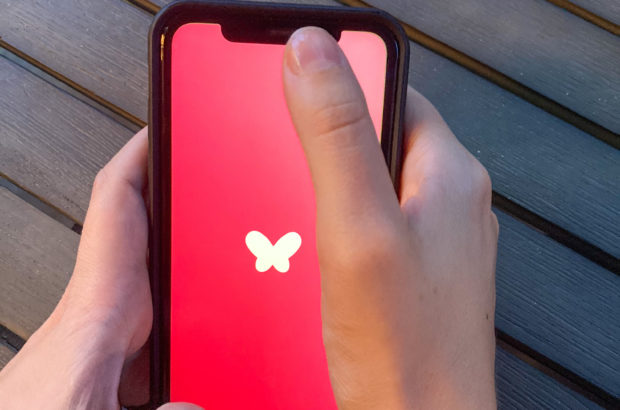
The Muslim dating app Muzmatch has one of the boldest taglines in the world of online dating: “Muslims don't date – they marry.”
In one breath the statement encompases the views of Musim scholars’ Islamic interpretation of dating: unless it is done the right way, it is haram–forbidden by Islamic law.
With the onslaught of the COVID-19 pandemic last March, Muzmatch saw a massive surge in use, with a 45% increase in user downloads globally within the week of March 15 to March 22 2020. The app can be argued to have shown young Muslims a more halal–or permitted_way to form romantic connections online rather than in person. However, with cities opening up as COVID infection rates subside and populations receive their vaccines, will young Muslims continue meeting each other online?
That is the question that many Muslims are asking but the answer is not at all clear. It turns out that there are both advantages and disadvantages to the new dating technology. Some say that these apps are certainly more halal because of the way in which they limit physical contact, some say there are still ways to sin through the usage of the app.
Most agree, however, that the apps are certainly convenient. How permissible they are, ultimately all comes down to the intention of users.
Fahmida Rashid is a Long Island native who self describes as a “kind of quirky, weird person.” She believes her personality and unique sense of humor do not come across as well online as they do in person. But the pandemic forced her to limit her social interactions, so she took a chance on meeting a partner through dating apps like Muzmatch.
Now though, she and many others prefer to revert back to dating in person.
“I think I do prefer dating in person – have I done that before, or have experience with that? That's probably a no,” Rashid, 27, said, “[but] like going to the mosque, or like going to events, going for yoga, going to things I like and just trying to meet people that way, so that there's at least a commonality.”
In Islam, modern, Western definitions of dating should not exist. Islamic rules dictate a man and a woman should not be left alone for fear of committing physical sin. In fact, the Prophet Muhammad once said “whenever a man is alone with a woman, Satan is the third among them." Therefore, instead of modern ideas of dating, Islam encourages “dating” as a chaste, focused courtship with the purpose of marriage, which is not just between two people, but also with their families involved.
According to Islamic teachings, that is what should exist, however, despite the rulings, many Muslims have still dated alone, without the involvement of families and not always with the purpose of marriage. Apps like Muzmatch have tried to change this and create a more acceptable way for Muslims to date and marry.
Through the Muzmatch nature of being online, its marriage-focused marketing enables couples to add a third person to their private chat, the app caters to three important islamic rules around dating:
- It must always be done with the purposes of marriage.
- A mahram or chaperone must be present while a man and a woman get to know each other for marriage.
- By being online men and women do not risk the chance of pre-marital sexual relations.
Salams (formerly Minder) is another Muslim dating apps that has halal-friendly features such as a “stealth” mode where a user can pick who sees their profile. Both apps offer the option to have your photos blurred in an effort to guard modesty, a virtue that is highly encouraged in Islam. In effect, these newer Muslim dating apps create an experience more in line with Islamic practices, and Muzmatch founder Shahzad Younas agrees.
“The app is quite unashamedly, for Muslims looking to find a life partner, you know, and it's quite unashamedly not if you're just looking to date or mess around.” said Younas. “We make it quite clear, even when you build up your profile, of what isn't acceptable.”
While the experience may be close to Islam, the reality for many Muslims can be quite different.
“I may be a cynic, but I think it's a little bit naive to think that it makes [dating] more halal because in my experience, it hasn't,” said Rashid.
This is not the case for all Muslims who began using dating apps during the pandemic. Halima Aweis, a Muslim woman from Rochester, whose videos on her experiences using dating apps like Muzmatch and Salams, are popular on Tik Tok amongst many other young Muslims. For Aweis, the pandemic showed her a more halal and convenient way to date, especially with long-distance, which she prefers. Aweis says that she intends to stick to Muslim dating apps even as New York opens up from pandemic restrictions.
“Because of not being able to be around each other in person for long periods of time, the fact that the vast majority of your communication is virtual, whether it's on FaceTime or on the phone, and that you're kind of limited because of proximity because your ‘x thousand’ miles away, you're not given the opportunity to do lots of free mixing and engage in things that like aren't permissible,” she said.
The benefit of these apps, as the six people interviewed for this story have agreed, is that it is certainly a convenient way to meet potential partners. Chastity McFadden, a Muslim woman who both converted to Islam and tried out Muslim dating apps during the pandemic, found that the apps broadened her reach.
“I think what apps could do is help you date outside of your small circle, which tends to be like, one culture, one area, one idea of what Islam is and sometimes that [is hard to do] in your space, so finding people that don't exist in that space might make it actually easier,” said McFadden.
The apps certainly do their best to try to create a halal environment, but at the end of the day, it all ultimately comes down to the intent of users – a point that Younas was sure to make.
Farwah Sheikh, a nutritionist and host of Spill the Chai podcast, which discusses dating as a Muslim, adds onto this by explaining that connecting on dating apps still holds some haram elements as they are based off of physical attraction, but what comes of that is the intention of users.
“You are swiping based off of someone's aesthetic, like right off of their physical appearance, because you're attracted to them to some extent and then the conversation can lead to a place where when you do meet you do want to become physical because you've built up that [attraction],” said Sheikh, “or, it really just eliminates that physical factor [of meeting] and you just get to know someone and then you know you move from there – I think it's the intention of the person, of how they're going in talking to somebody.”
Though some may argue that dating online is still a much more innocent option than dating in-person because of the reduced risk to physically sin, Salwa Ameen a Muslim marriage life coach said that dating digital does not actually reduce the risk of sinning. Conversation on the app may still be inappropriate, including the exchange of elicit photos.
Because of the subjective nature of human intention, despite the apps’ purposes to create a more halal environment for dating, many Muslims, particularly women, have had to deal with inappropriate advances. Because of this they agree with Rashid’s point of view.
Sanjida Rashid, who is the twin-sister to Fahima and has used several Muslim dating apps, spoke about how her own personal experiences with inappropriate behavior on the apps is what makes her prefer prefer dating in person.
“In person I feel that there's still a level of decorum, but online, people feel brave enough to say whatever they want,” Rashid, 27, said. “I had one guy straight up ask me to send nudes and it’s like I just couldn't even believe I was on a Muslim dating app.”
In addition to this, more features like the option for a chaperone or the option to blur a user’s photos do exist to allow a user to make their experience more halal, however, they are optional.
Rashid also expressed that though the feature of a chaperone was not available to her while she was using the Muslim dating apps, she would not have opted for the feature anyway because for her, privacy is necessary from the beginning.
“I don't know who the chaperone would be, whether it would be my parents or my sister, but I just feel that's weird because when you put a third person in the circle, it changes the dynamics of the communication,” she said.
Further, many Muslims believe that dating in person is the way to go simply because it is the best way to truly know the other person.
“I think the apps have this way of hiding who people fully are and you can’t understand even simple things like if your energies mesh well,” said McFadden. “It’s easier to hide the bad stuff about yourself on an app than it is in person.”
As things stand, many Muslims plan to revert back to dating in-person, however, the convenience of the apps has shown to be beneficial. For that reason Ameen believes that even with more people dating in person, dating online is still here to stay.
“I don't think that seeking a partner online will ever really go away,” said Ameen.
No Atheists in the Foxhole
No Atheists in the Foxhole
Neha Mehrotra | nm3148@columbia.edu
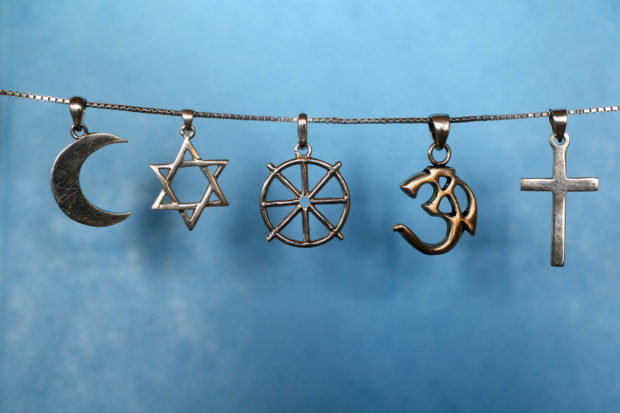
It’s Thursday, April 8, the beginning of the Jewish holiday of Passover, and Hillel, the Center for Jewish student life at Columbia and Barnard, is hosting its annual Seder – traditionally a time to gather around a table with family and friends. The center’s rabbinic intern, Andrew Oberstein, is officiating at the celebration. But today, when Oberstein kicks off the evening asking, “What makes this night different from all other nights?” he is referring to something over and above Passover’s traditional history. Though the formal characteristics of the occasion are the same—they will still have four questions, there will still be four children, they will still sing dayenu and they will still retell the story of Israelites exodus from Egypt—Passover is exceptionally unique this year.
Rather than sitting with others at a holiday table, Oberstein sits all alone in his living room in the Upper West Side, staring at his computer screen. People on his right and left are in their own homes instead of at his side. With grocery stores transformed into the new danger zones, tonight’s Seder plate consists of leftovers from his kitchen, though in one form or another, all the essential symbolic elements are there: the shank bone, vegetables, bitter herbs, eggs and a fruit and nut dish known as haroset.
This is Oberstein’s first—and God willing his last—Zoom Seder.
For years, surveys have indicated that Millennials (born 1981-1996) and Generation Z’ers (born 1997 onwards) are far less likely than older generations to identify with a religious group. Overall, 35% of adult Millennials, i.e., one in three, identify themselves as “religiously unaffiliated.” This is hardly a surprise, given the irreverent world we now live in. Rather than look up, we now prefer to look askance. We no longer need God to answer questions beyond our reach. The internet suffices. When Nietzche said that God is dead, he was prescient. Agency is no longer surrendered to a higher power; instead, humans control their own lives. We are our own gods.
But to those who proclaim religion’s obsolescence, the Coronavirus pandemic sweeping the world has foregrounded a different reality: Far from being obsolete, religion has adapted to the need of the times, and in the process, has succeeded in proving its own dynamism and continued relevance. Amongst the younger generation too, religion—if once seen as static dogma—is now appreciated for its reflexive, reflective timelessness.
April is a time of renewal in religions all around the world: Jews celebrate Passover; Christians come together for Easter; Muslims fast for Ramadan; Hindus light firecrackers for Ram Navmi; and Sikhs offer societal service for Baisakhi. This year, as students across the country vacated college campuses and returned home, on-campus festivities were understandably abrogated. But as Columbia Religious Life communities attempted to salvage what little celebratory spirit they could, they realized that COVID-19 might have derailed some aspects of their yearly rituals, but it had accentuated other, more underlying, connotations of the festivals themselves.
“In many ways, an out of the ordinary Passover is part of the fabric of Jewish history,” said Oberstein at the start of the virtual Seder. Oberstein, a rabbinical student at Hebrew Union College-Jewish Institute of Religion, only recently joined the Columbia/Barnard team as an intern. The online group he is officiating at today comprises 20 people, most of them students and alumni of the university, tuning in from the isolation of their homes.
“Jews kept Passover in underground caves during the Crusades, they kept it during the Holocaust, in ghettos, in concentration camps. And today, it’s a new reality. Today, we gather alone in front of our Ipads and laptops. But the spirit of the holiday is stronger than COVID-19 and maybe now, more than ever before in our lives, we need this story of the possibility of redemption, the story of hope.”
The very next day, Columbia Muslim Life hosts its weekly Friday Jummah Zoom. The student religious life adviser for Muslims, Amina Darwish, introduces the speaker for the afternoon: Imam Suzanne Kasim from Berkeley, California, who will be heading the prayer today. It’s the week leading up to Ramadan, and Kasim’s sermon emphasizes the holiday’s significance in these crisis-ridden times.
Darwish, who earned her traditional Islamic studies certifications from the Qalam Seminary in Dallas, and the Critical Loyalty Seminary in Toronto, Canada, knows Kasim from before, and the two keep up a warm, friendly banter throughout the sermon. Their conversation is punctuated by frequent laughter. “I love laughing with you friend,” exclaims Darwish at one point. “We always laugh so much, we do,” sighs Kasim.
Kasim goes on to frame her sermon around the twin axes of qadr (Allah’s divine decree to his followers) and dua’ah (followers supplication to Allah): “On the night of Ramadan, any dua’ah you make is answered,” says Kasim. Ideally, if you’re dua’ah is strong, it can push adversity away. If you’re dua’ah is weak, meaning you’re distracted, or you don’t have a strong relationship with Allah, you are liable to be afflicted with calamity. Ramadan, however, is a special circumstance. “If an illness or calamity happens, and a person makes a dua’ah on Ramadan, that dua’ah has the power to change Allah’s qadr. Allah accepts that person’s supplication and changes His decree.” And so Kasim encourages Muslim students to spend Ramadan supplicating to Allah to deliver humanity from this pandemic.
Personally, Kasim believes Allah has a purpose for the pandemic. “I think we have been abusing ourselves and the people and the earth around us. And Allah has paused everybody to think about what we’re doing. This is a pause.” Though Amina Darwish, the Islamic life advisor, agrees, she knows that for some students, this is going to be a really difficult test. “I know a student who lost her job because of this crisis and is now struggling to pay rent,” she says. Students come to Darwish with all kinds of concerns, now more than usual. Someone wants to know how they can serve those less fortunate than themselves; another student is worried about her grandmother, who is in a nursing home in Harlem; a third wonders how to sustain a sense of community in times like these. “I don’t think people’s religiosity has increased but they are more self-reflective now. Because they have so much time, they have turned inwards,” says Darwish.
Two days after Friday Jummah, it’s, once again, a time for celebration. Easter Sunday is here, and 39-year-old Ryan Kuratko, the chaplain of Columbia’s Episcopal Campus Ministry, has a packed evening: a 5 p.m. Bible study followed by a 6 p.m. Easter service. Only two students show up online for the Bible study, but one of them, undergraduate student Andi Dixon, encourages me to come for the 6 p.m. service because, as she puts it, “everyone and their mothers will be there.” And true enough: 17 students tune in an hour later, some accompanied by mothers, fathers, grandmothers, others settled in bed, alone but happy enough to chatter away. In fact, Kuratko’s own father has tuned in from North Carolina, and sits through the entire service, beaming proudly.
“In a way, online services are more intimate, more personal, because you can see people in their own homes, with their own family, like peeking into their window,” says Kuratko. Before this, Kuratko had never seen student Christine Piazza’s bedroom; he didn’t know Madeleine George gorged on chocolate when home alone; and he had definitely never met so many students’ parents all at once. “It’s a new kind of community,” he says.
It is indeed a new kind of community, even if it’s a smaller one: Across the board, Columbia’s religious life advisors agreed that the number of students attending weekly meetings has fallen, approximately by half. However, they didn’t think this was an indication of anything other than students having left campus to go back home. “This is just a disruptive moment,” says 40-year-old Rev. Dr. Ian Rottenberg, Dean of Religious Life. “My guess would be every event that had 20 people prior to students dispersing has seen drop offs. If I had been a college student, I wouldn’t have gone to my clubs at a time like this. I would just be trying to finish the semester. And a lot of students I’ve spoken to, their usual clubs have not reconvened since the breakup. So I don’t think it’s a religion specific thing. In fact, a 50% attrition rate is pretty good I would say.”
Though weekly attendance has fallen, the number of appointment requests for religious counseling received by Rottenger’s office have remained more or less constant. For his part, Rottenberg has noticed increased anxiety amongst students. “This is because students are losing family members. And the worst part is, they can’t even be there with their loved ones at a time like this. People are passing away, and students can’t even have a funeral service for them, can’t pay tribute to them as they deserve.”
Times like these have, as many of the people I spoke to pointed out, propelled an acute religious awareness.
“Even my nonreligious friends are grappling with this,” says Simran Jeet Singh, the 35-year-old Sikh pastor at Columbia. “People are realizing what the absence of community means, and are trying to connect - with themselves, with other people. And now they finally have the time to do it.” Darwish, the Islamic life advisor, admits that she has been praying a lot more, for people in all corners of the world whom she doesn't even know.
Virtual Buddhist meditation circles are witnessing an increase in new members frequenting weekly sit-ins to calm their anxieties. “Buddhist teachings allow students to take this crisis well,” says Rev. Doyeon Park, Buddhist religious life advisor at Columbia who received full ordination in 2007 and has since been working in New York City. “Because Buddhism teaches them about impermanence and how to cope with these changed conditions.”
Forty-one-year-old Father Dan O’Reilly, Director of Columbia Catholic Ministry, puts it most succinctly: “There are no atheists in the foxhole.”
Pledging Your Life to Allah, the Ahmadi Way
As published in Religion Unplugged
Pledging Your Life to Allah, the Ahmadi Way
Neha Mehrotra | nm3148@columbia.edu
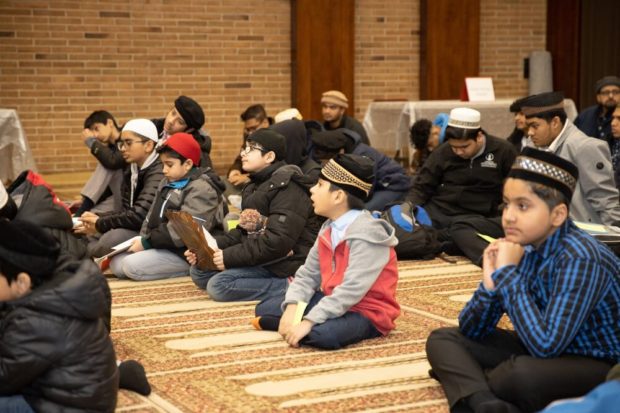
NEW YORK— Suman Amara Ahmad has always known that her future was not hers to chart. But she doesn’t mind. She has made her peace with it. That, she says, is the fate of being a waqf-e-nau. You have no idea where you will land up. “I could be sent anywhere in the world,” she says. “It’s all up to the Khalifa.”
On a recent Saturday morning before the coronavirus lockdown, Amara was one among approximately 50 waqf-e-nau children who gathered at Bait-uz-Zafar, an Ahmadi mosque in Queens, New York. In Arabic, “waqf” means to pledge and “nau” means new.
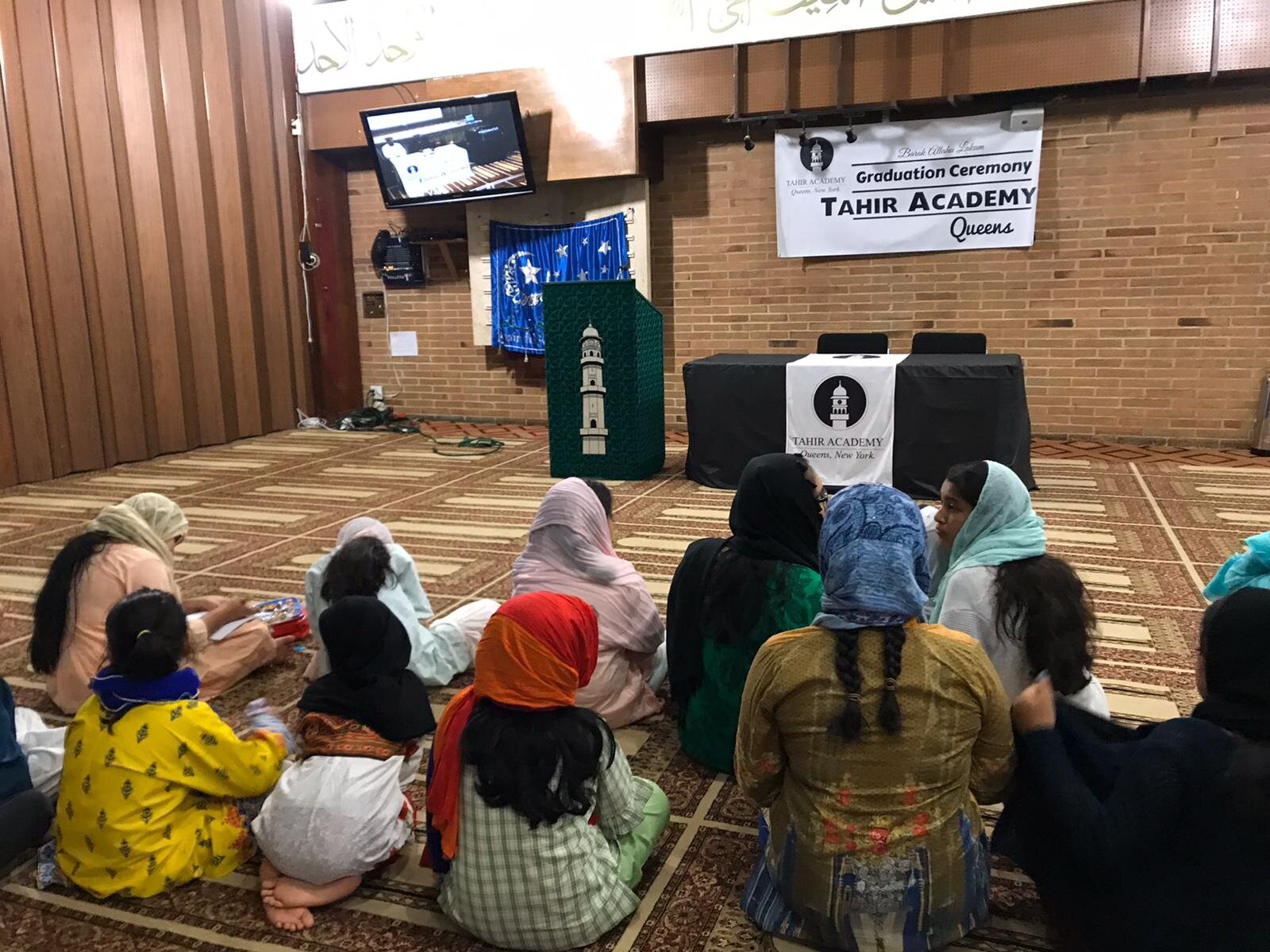
The waqf-e-nau journey begins in the womb, when pregnant mothers offer their unborn child to Allah. This is not a metaphorical pledge but an actual one. When parents decide on rearing their child as a waqf-e-nau, they write a letter to their Khalifa (supreme leader) surrendering their child to the supreme leader, to assign them a societal role as he sees fit. This waqf-e-nau ijtema (gathering) was a biannual test of all the children pledged by this ritual, to measure their progress and reward excellence.
At 22 years old, Amara is too old to take part in the test, which is meant for children ages 8 to 15. But having gone through the same process when she was younger, she is familiar with its ins and outs and is here to help. The children themselves look excessively washed and combed and a little nervous. They have reason to be. At today’s ijtema, they will be tested on six standards: 1) Religious knowledge and etiquette 2) Hadith, sayings of the Prophet Muhammad 3) Quran 4) Salaat, the liturgy of prayer to follow five times a day 5) Nazm, a genre of Urdu poetry and 6) Prayer that is voluntary and not part of salaat. The pledges are marked for their performance in each category and, after a grand totaling, the highest scorers will be awarded prizes.
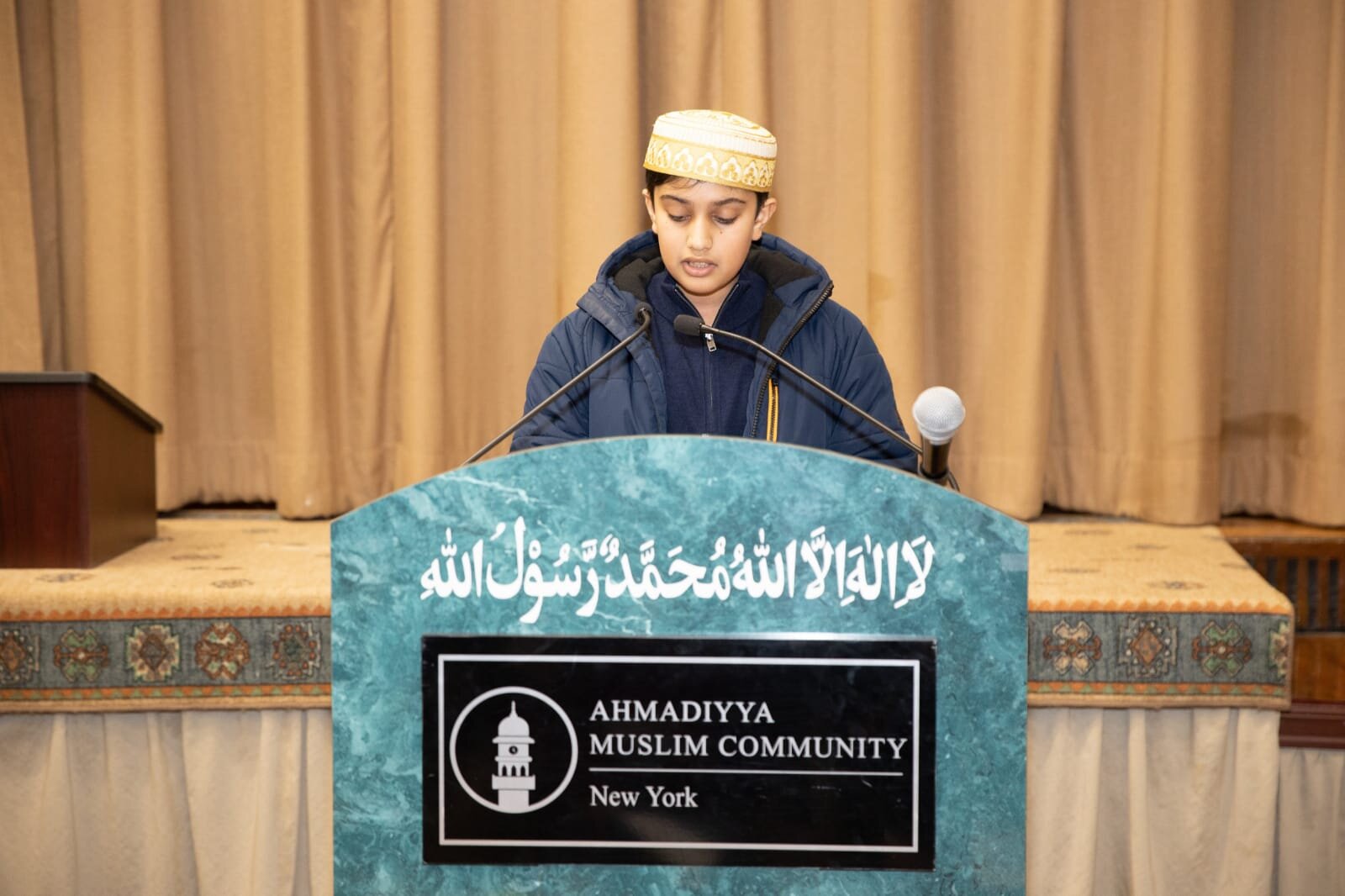
This practice is unique to a particular sect of Islam called the Ahmadiyyas. Though Sunnis and Shias are the two major sects of Islam, the religion has a number of offshoots, each with its own variations in belief and practice. Historically, Ahmadis have stood apart from mainstream Islam. While traditional Muslims believe that there is one God and Prophet Muhammad is the last prophet of God, Ahmadis believe Mirza Ghulam Ahmad (1835-1908), who founded the Ahmadi movement, was sent to renew the Prophet Muhammad’s message. Ahmadis do not propose a “return of the prophet” but rather consider Ghulam Ahmad to be the Messiah invoked in the Quran who is destined to come and renew the prophet’s message. The Ahmadiyya Muslim community teaches that God sent Ghulam Ahmad as a metaphorical second coming of Jesus Christ to end religious wars, condemn violence and restore morality, justice and peace.
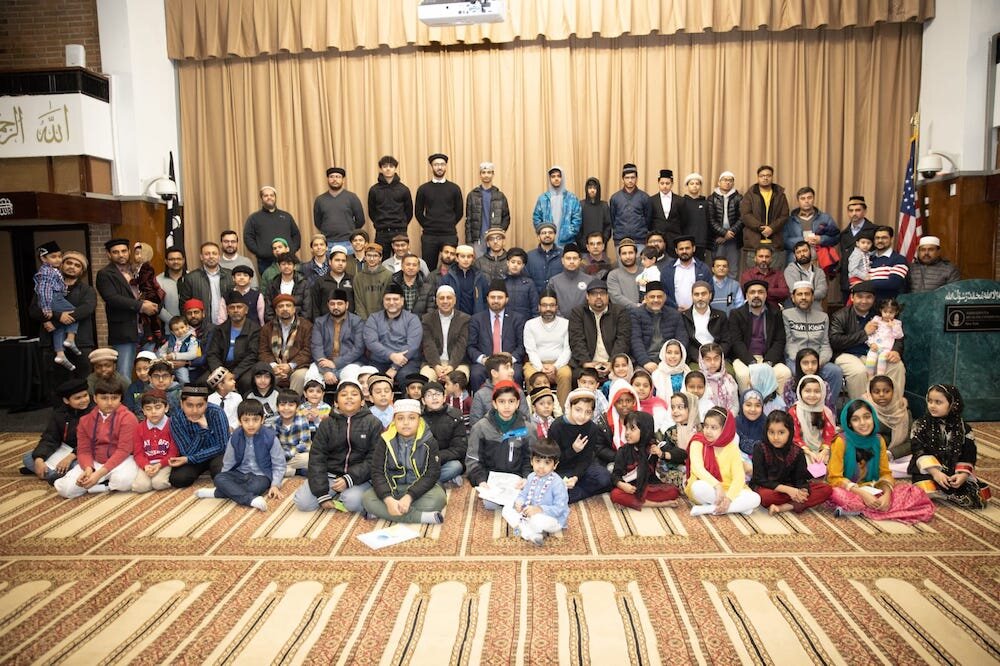
Due to this difference of perspective, a large section of Muslims consider Ahmadis heretics and refuse to acknowledge them as Muslim. In response, the Ahmadis have largely cut themselves off from mainstream Islam. Though Ahmadis engage in missionary work in the communities they are a part of, their main focus is on consolidating strong cross-continental networks within their own community. The waqf-e-nau is an extension of this.
“We think waqf-e-nau children are special because they are going above and beyond to fulfill the responsibilities of an Ahmadi Muslim,” says Farah Ahmad, a mother who has pledged all three of her children to be waqf-e-nau, all of whom are participating in the day’s test: two sons, ages 13 and 8, and a daughter age 9.
Since the initial pledge is made before the actual birth, the child has no say in the matter, at least until the age of 15. From birth till their 15th birthday, waqf-e-nau children, like Amara, are given a special education. Every weekend, when most children are kicking back after a week of school, the waqf-e-nau attend Saturday training at the masjid, learning the finer points of their religion. Once they turn 15, the children are asked to renew the pledge made by their parents.
At this point, they could potentially demur and decide against continuing to be a waqf-e-nau. “But that’s rare. Once parents have committed, most children see it all the way through,” says Ahmad. None of her three children have reached the age of 15 yet, but Ahmad is confident that all her children will renew their pledge when the time comes. The first renewal is followed by a second renewal at 18, and a third one at 21. In this ultimate pledge, the Khalifa meets with the child, and based on the child’s chosen profession, assigns him to that part of the world where he will be most useful to society. The child in turn has to obey and go where the Khalifa instructs him.
The murabbi of the Bait-uz-Zafar mosque, Mahmood Kauser, whose job involves providing religious training and proselytization, explained the reason for this seemingly strange practice:
“Giving up one’s life to God is freedom. Let me elaborate. If I wave a ball at a dog, he will go fetch it. His eyes are glued to the ball. Is this dog free? No. Similarly, if one is bound by the wants and desires of this world, one is hardly free. Waqf-e-nau are pledged and brought up with one goal: to be free of all worldly desires. Their sole purpose is to be beneficial to mankind.”
One mother claimed that she was asked to pledge her child in a dream. “When I was in college, I dreamt that I was in the OR and my mom and sister were standing around me,” she said. “As I was lying there, my baby was brought to me wrapped in red cloth. On the cloth, it said in clear letters ‘waqf-e-nau.’”
Another mother said that everything she has belongs to Allah and her own child is no exception. “A child is a gift from Allah and so absolutely belongs to Allah first.”
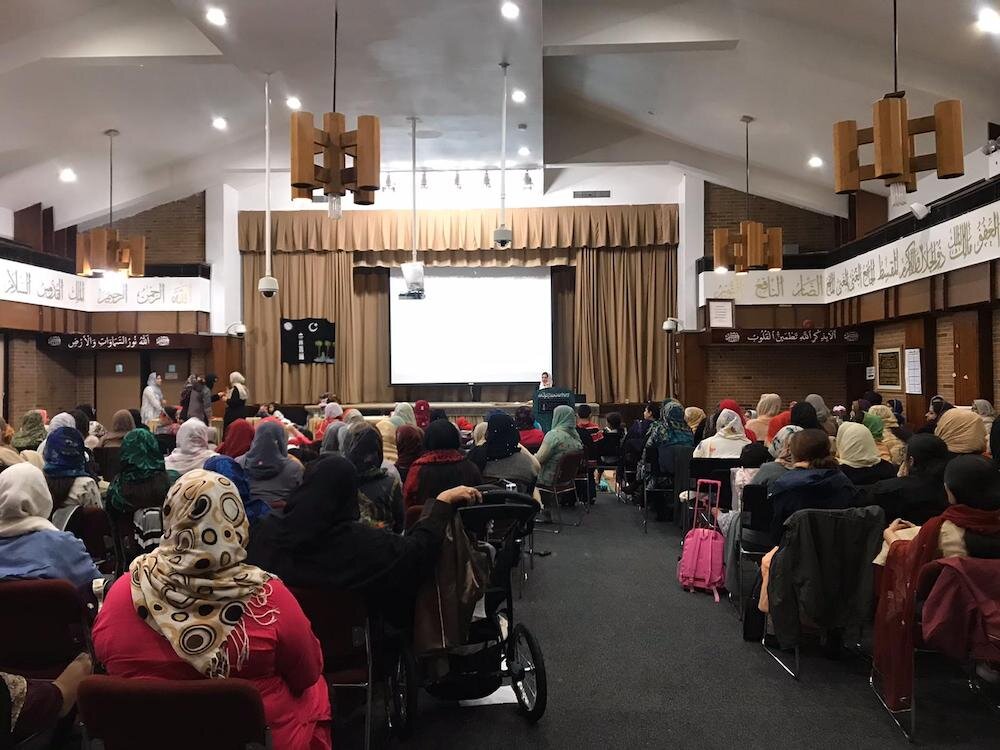
Amara’s mother followed a similar reasoning when she first pledged Amara as a waf-e-nau. It’s been 22 years since then. Amara is currently in her second year of studying medicine, with no inkling of what her future will look like.
“As of now, medical students are being sent to Guatemala because they are most needed there,” she says. “But when I met the Khalifa last year, he told me that he won’t send me there. He is going to send me somewhere else. Let’s see.”
She glances around the room at the 8-12-year-olds demonstrating their knowledge of everything from the rules of Islamic dining to poems espousing the spirituality of Islam. Her eyes are warm and aglow. Perhaps she sees herself in these children, all of them bound to Allah, their futures lingering in the air, suspended, uncertain.

